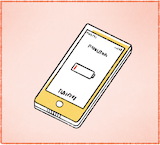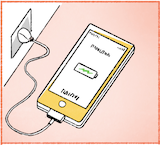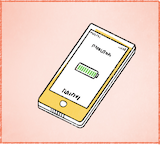


อันนี้คืออี่หยัง อันนี้เป็นโทละสับ
เป็นโทละสับยี้ฮ้อหนึ่งนี้หละ สี่เหลี่ยม เคี่ยงสีเหลียง
แล้วตอนนี้มันเป็นอี่หยังอยู่ แบ็ดเบิด หน้าจอกำลังสิดับ
ใซ้งานบ่ได้เลยขั้นแบ็ดเบิดแม่นบ่ แม่น
ขั้นแบ็ดเบิดสิเฮ็ดหญังได้บ่ บ่ บ่ได้เลย เฮ็ดหญังบ่ได้เลย ใซ้งานบ่ได้พ้อมนอกจากสิไปซ่าดแบ็ดโทละสับ ให้มันมีแบ็ดอยู่ในโทละสับเคี่ยงนี้
19
โทละสับ เป็นโทละสับเคี่ยงหนึ่งกำลังซ่าดแบ็ดอยู่ ซ่าดแบ็ดเตอลี้อยู่
เป็นหญังเขาคือซ่าดแบ็ดเตอลี้ แบ็ดเตอลี้ในโทละสับเคี่ยงนี้ หลือว่าแบ็ดในเคี่ยงนี้อาดสิเบิดแล้ว อาดสิบ่มีแล้ว เขากะเลยมาซ่าดเพื่อที่สิใซ้งานโทละสับเคี่ยงนี้
เป็นหญังต้องซ่าด ขั้นบ่ซ่าดโทละสับกะบ่สามาดใซ้งานได้ ขั้นโทละสับบ่มีแบ็ดกะใซ้งานบ่ได้ เพาะสะนั้นแล้วต้องซ่าดแบ็ดโทละสับ มันจั่งสิใซ้งานได้ปกกะติ หลือว่าใซ้งานได้คือเก่า
20
อันนี้คืออี่หยัง อันนี้กะเป็นโทละสับ เป็นโทละสับเคี่ยงหนึ่ง
แล้วมันเกิดอี่หยังขึ้นตอนเนี้ย กะโทละสับคือเก่านั้นหละ บ่มีหญังเกิดขึ้น เห็นแต่ว่าในโทละสับเคี่ยงนี้มีแบ็ดเต็มปี้ลี้ เต็มปี้ลี้เลยหละ บ่มีหม้องฟิ่วเลย
แบ็ดเตอลี้เบิ่งจากใส กะเบิ่งหม้องก้อนสีเขียวๆ หนะ ก้อนสี่เหลี่ยมหน่อยๆ อยู่กางโทละสับ มันกะสิเป็นสีเขียว คือ อันนั้นคือแบ็ดเตอลี้
ขั้นมันเหลียเคิ่งหนึ่ง เหลียขีดสีเขียวเคิ่งหนึ่ง กะเอิ้นว่าแบ็ดเตอลี้มีเคิ่งเดียว
ขั้นแบ็ดเบิดกะคือเป็นขีดสีเหลียง คือจั่งผ่านๆ มา แล้วบ่สามาดใซ้งานได้
ขั้นมีแบ็ดเตอลี้มันสิใซ้งานได้บ่ ใซ้งานได้ ขั้นมีแบ็ดเตอลี้กะสามาดใซ้งานได้ เฮ็ดหญังได้ซู่สิ่งซู่อย่าง
Link to overview page
Link to dictionary
| Isaan | Pronunciation | Tones | Thai | English/Notes |
|---|---|---|---|---|
| อัน | an | M | อัน | 1. thing, object 2. general clf. for objects |
| นี้ | ni: | HF | นี้ | 1. this 2. here |
| คือ | khʉ: | HR | คือ | 1. to be, to resemble, like, as 2. why {บักหล้าคือบ่เก็บโต่ะแน่ = [addressing a young boy] Why haven't you cleared the table?} |
| อี่หยัง | i:-yaŋ | H-M | อะไร | 1. what {นี้คืออี่หยัง = What is this?} {มื้อนี้เจ้าเฮ็ดอี่หยัง = What are you doing today?} {กินเข้างายกับอี่หยัง = What did you have for breakfast?} 2. something, anything, (in negations) nothing {บ่ต้องเฮ็ดอี่หยังอีกเลยนอกจากใส่ปุย = [we] don't need to do anything besides adding fertilizer} |
| เป็น | pen | M | เป็น | 1. to be, to exist 2. to be able to 3. to suffer, sth. happens to 4. เป็นหญัง[...]คือ in initial position: why? {เป็นหญังเขากะคือแปงฟัน = Why is he brushing his teeth?} {เป็นหญังเคี่ยงบินมันคือสิตก = Why is the airplane falling down?} |
| โทละสับ | tho-la-sap | HR-H-M | โทรศัพท์ | phone Notes: pronunciation: also realized as โทระสับ |
| ยี้ฮ้อ | yi:-hɔ: | HF-HF | ยี่ห้อ | brand, brand name |
| หนึ่ง | nʉŋ | H | หนึ่ง | 1. one 2. after adjective: intensifier {บักคักหนึ่ง = very much} {อันบักใหญ่หนึ่ง = very large}, or attenuates the meaning {กะดาดมันแผ่นน้อยๆ หนึ่ง = the piece of paper is [relatively] small} |
| นี้หละ | ni:-la | HF-M | นี่แหละ | auxiliary for emphasis at the end of a phrase |
| สี่เหลี่ยม | si:-li:am | H-H | สี่เหลี่ยม | rectangle, square |
| เคี่ยง | khi:aŋ | H | เครื่อง | 1. machine, engine 2. clf. for machines, airplanes, electronic devices etc. Notes: pronunciation: also realized as เคื่อง |
| สี | si: | M | สี | 1. color 2. colored pencil, crayon |
| เหลียง | li:aŋ | M | เหลือง | yellow |
| แล้ว | lɛ:o | HF | แล้ว | 1. finished 2. already 3. and then, and next (especially แล้วกะ) 4. auxiliary for past tense |
| ตอนนี้ | tɔ:n-ni: | M-HF | ตอนนี้ | now |
| มัน | man | HR | มัน | it (also used to refer to people) |
| อยู่ | yu: | H | อยู่ | 1. to be (located) at 2. yet, still 3. auxiliary indicating continuous or progressive action {ทอดปาอยู่ในกะทะ = (in the process of) frying a fish in the pan} {แม่กำลังเมี้ยนเฮียนอยู่ = mother is cleaning/tidying up the house} |
| แบ็ด | bɛt | M | แบตเตอรี | battery Notes: see also แบ็ดเตอลี้ |
| เบิด | bə:t/bət | LF/M | หมด | 1. completely, totally, entirely {เทิงเบิด = all of them} {เบิดมื้อเบิดค่ำ = [all] day and night} {ขั้นพุโดยสานลงลดไฟเบิดแล้ว [...] = when all passengers have disembarked […]} {เขากินเบิดบ่ = Has he eaten all of it?} 2. to be finished, to be exhausted, to come to an end, to have no more {โน่ดบุ่กแบ็ดเบิด = the notebook is out of battery/the notebook needs recharging} |
| หน้าจอ | na:-jɔ: | LF-M | หน้าจอ | monitor, screen |
| กำลัง | gam-laŋ | M-HR | กำลัง | auxiliary indicating continuous or progressive action |
| สิ | si | M | จะ | future tense auxiliary {เขากำลังสิตื่น = he's about to wake up} {สิไปตะหลาด = [I'm] going to the market} |
| ดับ | dap | M | ดับ | 1. inactive, out (light, electronic device) 2. to extinguish (e.g., a fire, smell etc.) {ดับไฟ = to extinguish a fire} {ลดดับเพิง = fire truck} |
| ใซ้งาน | sai-ŋa:n | HF-HR | ใช้งาน | to use, to put to use |
| บ่ | bɔ: | H | ไม่ | 1. no, not 2. question particle, transforming a statement into a question Notes: spelling exception in line with common usage on social media |
| ได้ | dai | HF | ได้ | 1. can 2. to get, to obtain 3. before verb: indicating past tense 4. บ่ได้ + verb: not |
| เลย | lə:i | HR | เลย | 1. futher on, beyond, past {เข็มน้อยเลยเลขสิบสองไป = the minute hand has passed number twelve} 2. too much 3. at all 4. definitively 5. completely, utterly |
| ขั้น | khan | LF | เมื่อ | when, if |
| แม่นบ่ | mɛ:n-bɔ: | H-H | ใช่ไหม | question particle: ..., right? ..., isn't it? ..., don't you? etc. {เจ้าได้เห็นสิ่งนั้นแม่นบ่ = You've seen that, haven't you?} {ฝนกำลังตกแม่นบ่ = It's raining, isn't it?} {นี้คือกะคุแม่นบ่ = This is a bucket, isn't it?} |
| แม่น | mɛ:n | H | ใช่ | 1. yes 2. affirmative particle |
| เฮ็ด | het | H | ทำ | to do, to make |
| หญัง | ɲaŋ | M | อะไร, เป็นหญัง = ทำไม | 1. what {เขากำลังเฮ็ดหญัง = What is he doing?} {ธูปเอาไว้เฮ็ดหญัง = What are incense sticks for?} 2. something, anything, (nothing) 3. เป็นหญัง[...]คือ in initial position: why {เป็นหญังเขาคือใส่บักพิกลงไปในกวยเตียว = Why is he putting chili in [his] noodle soup?} {เป็นหญังหน้าต่างมันคือเปิด = Why is the window open?} {เป็นหญังมันคือมีควนไฟ = Why is there smoke?} |
| พ้อม | phɔ:m | HF | พร้อม | at the same time, also, too {มีตะเว็นพ้อม = the sun's out, too} {กะทะมีด้ามพ้อม = the pan has also a handle} |
| นอกจาก | nɔ:k-ja:k | HF-LF | นอกจาก | except, besides, apart from, other than |
| ไป | pai | M | ไป | 1. to go 2. auxiliary indicating action extending into the future |
| ซ่าด | sa:t | H | ชาร์จ | to charge (a battery, a device) Notes: also frequently pronounced ช่าด [cha:t] |
| ให้ | hai | LF | ให้ | 1. to give {หมอกำลังเอายาให้คนป่วยกิน = the doctor is giving the patient medicine} 2. for 3. to allow, to be allowed |
| มี | mi: | HR | มี | 1. to have 2. there is |
| ใน | nai | HR | ใน | in, within |
| แบ็ดเตอลี้ | bɛt-tə:-li: | M-M-HF | แบตเตอรี | battery Notes: see also แบ็ด |
| เขา | khao | M | เขา | personal pronoun: he, she |
| หลือ | lʉ: | M | หรือ | or |
| ว่า | wa: | H | ว่า | 1. that, as {คำว่า X = the word X} 2. to say |
| อาด | a:t | LF | อาจ | 1. might, may, will 2. likely |
| กะ | ga | M | ก็ | 1. then, consequently 2. also |
| มา | ma: | HR | มา | 1. to come 2. auxiliary expressing action towards the present or focal time {กะคุเฮ็ดมาจากอี่หยัง = What is the bucket made of?} {แล้วเขากะเก็บเงินจากพุนั้นมา = and then she takes the money of that person} |
| เพื่อที่ | phʉ:a-thi: | H-H | เพื่อที่ | in order to, so that Notes: the vowel เอือ is likely to be a Thai loan |
| ต้อง | tɔŋ | HF | ต้อง | to have to, must |
| สามาด | sa:-ma:t | M-HF | สามารถ | can, to be able |
| เพาะสะนั้นแล้ว | phɔ-sa-nan-lɛ:o | H-M-HF-HF | เพราะฉะนั้นแล้ว | therefore, for that reason, consequently Notes: pronunciation: also realized as เพาะฉะนั้น |
| จั่ง | jaŋ | H | ค่อย (?) | then, afterwards {ต้องใซ้น้ำมันพ้อม มันจั่งสิทอดได้ = one needs to use oil as well, then one can fry [food]} |
| ปกกะติ | pok-ga-ti | M-M-M | ปกติ | 1. normal, usual 2. normally, usually |
| คือเก่า | khʉ:-gao | HR-H | as before | |
| เกิด | gə:t | LF | เกิด | 1. (often together with ขึ้น) to happen, to arise, to take place {เกิดอี่หยังขึ้น = what is happening?} {บ่มีหญังเกิดขึ้น = nothing's happening} 2. to be born 3. to grow {หนวดกะคือสิเกิดอยู่ใต้ดัง = a moustache grows below the nose} |
| ขึ้น | khʉn | LF | ขึ้น | 1. to go up, to increase 2. sun: to rise {ตะเว็นกำลังขึ้น = the sun is rising} 3. more 4. bus/train etc.: to get on, to board {พุโดยสานขึ้นลดไฟเบิดแล้ว = all passengers have boarded the train} |
| ตอน | tɔ:n | M | ตอน | when, period {ตอนสองโมงเซ้า = at 8 o'clock in the morning} {ในตอนกินเข้า = when eating} |
| เนี้ย | ni:a | HF | เนี้ย | variant of นี้ = this, here |
| นั้นหละ | nan-la | HF-M | นั่นแหละ | auxiliary for emphasis at the end of a phrase |
| เห็น | hen | M | เห็น | to see |
| แต่ว่า | tɛ:-wa: | H-H | แต่ว่า | 1. but 2. only {ฮู้แต่ว่าเขายืนอยู่พุเดียว = I only know that he's standing there by himself} |
| เต็มปี้ลี้ | tem-pi:-li: | M-HF-HF | เต็มมาก | full to the brim, really full |
| หละ | la | M | แหละ, ล่ะ | 1. auxiliary for emphasis at the end of a phrase 2. auxiliary to create a follow-up question: And what about ... ? {แล้วลดคันที่สองหละ = And what about the second car?} |
| หม้อง | mɔŋ | LF | ที่, แห่ง, บริเวณ | 1. place, area {หลายที่หลายหม้อง = in many places} {หม้องใดหม้องหนึ่ง = some place} 2. clf. for places |
| ฟิ่ว | fiu | H | ช่องว่าง | gap, space |
| เบิ่ง | bəŋ | H | ดู | 1. to look at, to see, to watch {เบิ่งโทละทัด = to watch TV} {เบิ่งหนัง = to watch a movie} 2. to guess {เบิ่งซงแล้ว ... = [I] guess / from what it looks like ...} |
| จาก | ja:k | LF | จาก | 1. from {... เฮ็ดมาจากอี่หยัง = ... is made from what?} 2. to depart |
| ใส | sai | M | (ที่)ไหน | 1. where? {สิไปใส = Where are [you] going?} {มาแต่ใส = Where are [you] coming from?} {กะทะอยู่ใส = Where's the pan?} 2. somewhere, anywhere {ใสกะได้ = anywhere, wherever you like} |
| ก้อน | gɔ:n | HF | ก้อน | 1. piece, lump, mass, chunk 2. clf. for bars of soap, stones, clouds, ice cubes |
| เขียว | khi:ao | M | เขียว | green |
| หนะ | na | M | final particle | |
| หน่อย | nɔ:i | H | หน่อย | a bit, a little bit, not much {as in หน่อยเดียว, หน่อยหนึ่ง} |
| กาง | ga:ŋ | M | กลาง | middle, center |
| นั้น | nan | HF | นั้น | that, there |
| เหลีย | li:a | M | เหลือ | to remain |
| เคิ่ง | khəŋ | H | ครึ่ง | half {เวลาห้าโมงเคิ่ง = half past five} {เขาบีบบักนาวเคิ่งน่วย = he's pressing half a lime fruit} |
| ขีด | khi:t | LF | ขีด | mark, line |
| เอิ้น | ə:n | HF | พูด, เรียก | to call, to say {เอิ้นง่ายๆ ว่า = in other words} {คนอี่สานเอิ้นว่า เป็นลูกคนกก = Isaan people call her ลูกคนกก} |
| เดียว | di:ao | M | เดียว | only, alone, single |
| ผ่าน | pha:n | H | ผ่าน | to pass |
| ซู่สิ่งซู่อย่าง | su:-siŋ-su:-ya:ŋ | H-H-H-H | ทุกสิ่งทุกอย่าง | everything, all things/kinds/etc. |